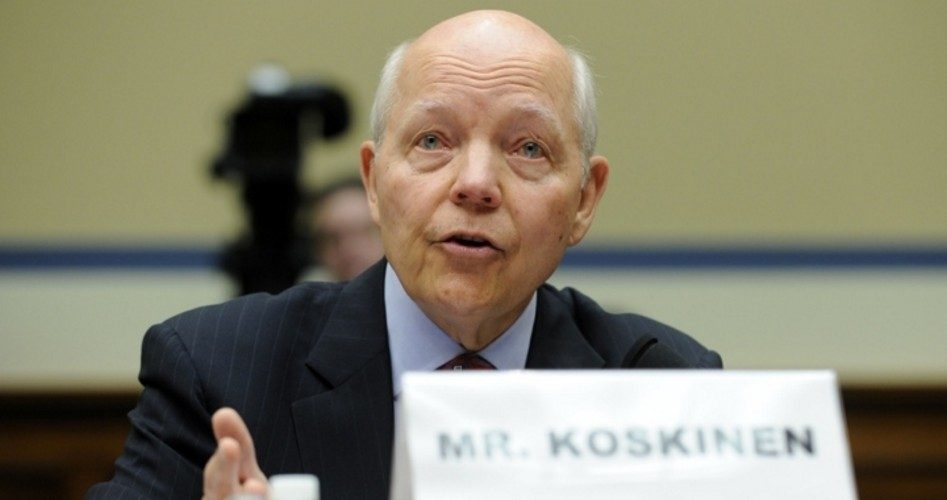
One unheralded part of the widely-criticized CRomnibus bill came to light last week when IRS Commissioner John Koskinen (shown) complained about the $346 million cut in his agency’s funding and the possible impact it would have on its services. The agency requested $12.4 billion, but the spending bill gave them just $10.9 billion, a reduction of $346 million from last year and $900 million below 2010 levels. In an e-mail to his employees on Wednesday, Koskinen warned them that “Our hiring — already limited at a ratio of one [new] hire for every five people who leave — will be frozen…. We will stop overtime except in critical situations.” He noted further that, adjusted for inflation, the IRS budget is about where it was back in 1998.
On Thursday, Koskinen expanded his remarks to include what those budget cuts over the last four years might mean for the agency, and for taxpayers. First, the agency’s responsibilities have been greatly expanded to include monitoring and enforcing the provisions of ObamaCare as well as the Foreign Account Tax Compliance Act (FATCA) requiring taxpayers with accounts outside the United States to report on them.
In addition, a government-wide mandated one percent cost-of-living increase in pay and benefits will cost the agency another $250 million. That means that the cut in funding by Congress translates into a real-world cut of closer to $600 million.
Koskinen told reporters about how the agency might have to handle the additional cuts: delaying refund checks and furloughing — giving people days off without pay — as well as reducing the number of enforcement agents tracking down tax cheats and identity thieves. Said Koskinen, “Everybody’s return will get processed. But people have gotten very used to being able to file their returns and quickly getting a refund. This year we may not have the resources, the people, to provide refunds as quickly as we have in the past.”
Because of the hiring freeze, taxpayers will likely find it difficult to reach the agency with questions as they struggle to complete their returns after the first of the year. According to the IRS website, “Last year … the IRS could only answer 61% of customer service calls, and those who got through had to wait nearly 18 minutes on hold.”
Enforcement efforts will be reduced too, which Koskinen said “are really a tax cut for tax cheats,” adding, “Because to the extent we have fewer people to audit and enforce the tax code, that means some people cutting corners on their taxes or not complying are going to get away with it.”
At present, according to the Finance Gourmet, the chances of being audited are about one out of a hundred, higher for self-employed or small business owners. But with 5,000 fewer enforcement agents than four years ago, those chances are becoming more favorable for the taxpayer.
Koskinen also said that shuttering the agency briefly is also being considered: “Are we going to have to shut the place down? At this point that will be the last thing we do … but there is no way we can say right now that that won’t happen … that would be the last option.”
The IRS says that because of the cuts in its budget, its ability to extract revenue from taxpayers not only is reduced — the agency estimates that tax cheaters and evaders are escaping with $6 billion every year — but by a multiple of the dollars being cut. The editorial board at USA Today estimates that for every dollar the agency’s budget is cut it loses between $4 and $5 in additional revenue. From the IRS’s own website, however, the amount is much greater than that:
In Fiscal Year 2013, the IRS collected $255 for each dollar it received in appropriated funds. It is therefore self-defeating to treat the IRS like a pure spending program in which a dollar spent is simply a dollar spent.
With the IRS, a dollar spent generates many dollars in additional revenue and thus helps to reduce the budget deficit.
And that really is too bad, according to the IRS, because “if the IRS lacks adequate funding to do its job effectively, the government will have fewer dollars to fund federal programs.”
It’s hard to generate much sympathy for the agency known for its lavish employee parties and bonuses, to say nothing of its deliberate attacks on conservative groups which, among other things, would like nothing better than to reduce the agency’s budget all the way down to zero.
In a delicious irony, the agency’s mischief and misconduct is accomplishing what those groups had in mind in the first place.
Photo of IRS Commissioner John Koskinen: AP Images
A graduate of an Ivy League school and a former investment advisor, Bob is a regular contributor to The New American magazine and blogs frequently at www.LightFromTheRight.com, primarily on economics and politics.

